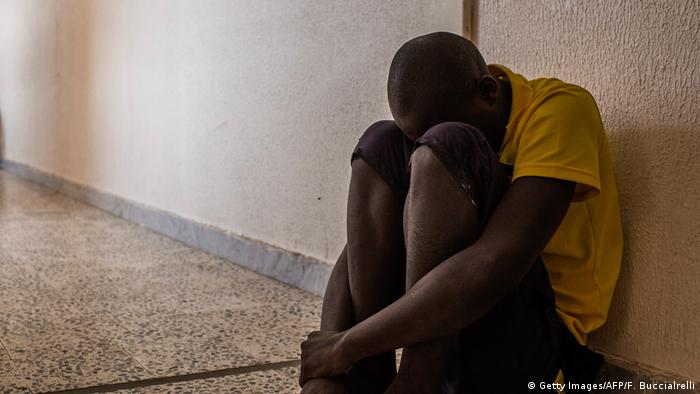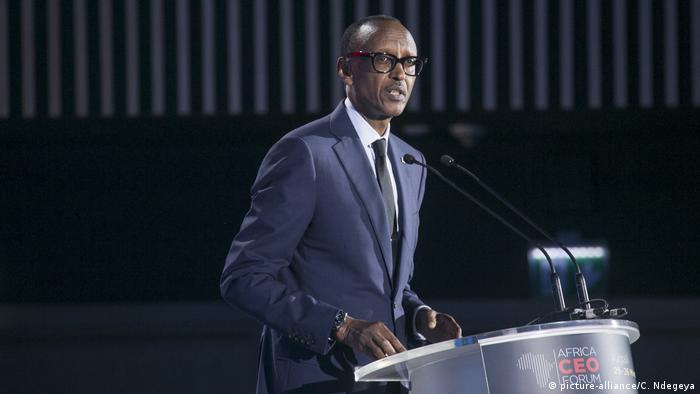Left to Right : Anselme Mutuyimana, dead by strangulation on March 9, 2019, Jean Damascène Habarugira, tortured and killed on May 8, 2017, Eugene Ndereyimana, missing since July 15, 2019, Boniface Twagirimana, missing since October 8, 2018, Syridion Dusabumuremyi, killed on September 23 2019, Illuminated Iragena, disappeared since March 26, 2016.
The Day Paul Kagame was caught pants down for killing Catholic gospel Singer: Rwanda gospel singer Kizito Mihigo's death likely a 'political assassination': Ensure Justice Over Kizito Mihigo Death
Rwanda's disappearing opposition
Disappeared or dead - Rwanda's opposition party Forces
Democratiques Unifiées is mysteriously "losing" members. The fate of the
government critics is unknown. But who is responsible?
For the last few years, a series of mysterious disappearances has shaken the FDU-Inkingi, a coalition of opposition parties against Rwanda's President Paul Kagame. 29-year-old Eugene Ndereyimana, last seen on July 15 in his home region in the southeastern Ngoma district of Rwanda, is the latest case. On that day, he set off for a FDU meeting in the northeastern city of Nyagatare, but all contact with him was lost five kilometers before he reached his destination. There has been no trace of the father of two children since then.
Attempts by the FDU to get information from Rwanda's Investigation Office produced no results. "The security service in Rwanda is so perfect, they can't tell us they don't know anything. They have the information, but they don't tell us," says Victoire Ingabire Umuhoza, chairman of the FDU Inkingi. The second vice president of the FDU, Justin Bahunga, also complains that the government remains silent on the disappearance. "But if it is a deliberate action of the state to stop any opposition operating in Rwanda, then it will be hard to think that we will get him [Ndereyimana] back. That is the worst-case scenario," Bahunga told DW.
Silence out of fear
For a long time now, opposition members in Rwanda have been exposed to intimidation, violence, prison or the prospect of disappearing as soon as they criticize President Kagame and his ruling party, the Rwandan Patriotic Front (RPF). President Paul Kagame has ruled the country since the genocide in 1994. While the regime has strengthened peace and economic growth, it also suppressed political criticism through extensive monitoring. Rwanda ranked 128th out of 167 countries on the 2018 Democracy Index of the Economist, which placed it between Ethiopia and China.
"Hardly anyone in Rwanda talks openly about the things that bother them, because otherwise they will be enemies of the state," explains a Rwandan human rights activist whose identity is known to the editors. "If you want to survive, don't be polically critical. People here remain quiet, not because they don't have anything to express, but because they want to avoid trouble," the activist told DW.
Sarah Jackson, Deputy Director of Amnesty International for East Africa, agrees: "Being in the political opposition in Rwanda is quite dangerous. Members have disappeared in recent years, the cases are unsolved, and that has a chilling effect." Amnesty International demands that the Rwandan government make the investigation public and credible. "It is incredibly worrying to see these rising cases of disappearances and the impact that this has on the broader political context in Rwanda," Jackson says.
Uncertain fates
No one knows who is behind the disappearances and deaths. Anselme Mutuyimana was strangled. His colleague Boniface Twagirimana disappeared from a high-security prison. He and eight other FDU party members were serving a prison sentence since their arrest in 2017 for forming an armed group and attempting to overthrow the government, something Twagirimana denied.
In May 2017, Jean Damascene Habarugira disappeared after being called to a meeting with a local security officer. Three days later, his family was called to collect his body from a local hospital. FDU Vice-President Bahunga explained that the eyes had been torn out and the head almost cut off. Habarugira had spoken out against the agricultural policy and the brutality of the police. Since March 2016, opposition activist Illuminée Iragena has also been missing.
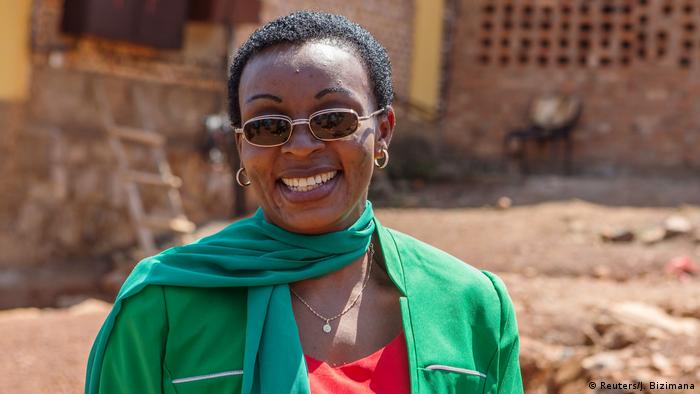 Victoire Ingabire served a prison sentence of 8 years for cooperation with a terrorist organization and "genocide ideology"
Victoire Ingabire served a prison sentence of 8 years for cooperation with a terrorist organization and "genocide ideology"Rwanda's government, which is seen as a flagship for economic progress in Africa, remains silent on the accusations and did not respond to DW's requests for comments. The Investigation Office spokesman was "not ready" to make a statement and the Minister of Justice could not be reached.
Crossing the red line
Even beyond the borders of Rwanda, life is not easy for the regime's critics. In 2014, Patrick Karegeya, Rwanda's former intelligence chief and later one of the founders of the opposition Rwanda National Congress, was strangled in his hotel room in South Africa. He had described Kagame as a "dictator" to the Ugandan newspaper "The Observer" and the BBC 2010, saying the president would not give up power. He also accused Kagame of having ordered a series of political murders. When Kagame was asked about a possible government involvement in Karegeya's death, he said: "Rwanda did not kill this person. But I wish Rwanda had done it." Kagame also sent a warning to the population: "Any person still alive who may be plotting against Rwanda, whoever they are, will pay the price."
FDU Vice President Bahunga says: "The system has put in place certain laws and policies that make it impossible, make it criminal, to question the government." The opposition in Rwanda must fear for their lives. "There is a red line, we don't know which one, but if you do pass or cross it, then you are actually liable for murder." But he sees a chance for change: "Ndereyimana is 29 years old, Mutuyimana was 30. The government considers young people as the greatest danger." That is why Bahunga hopes that this generation will free itself from oppression.
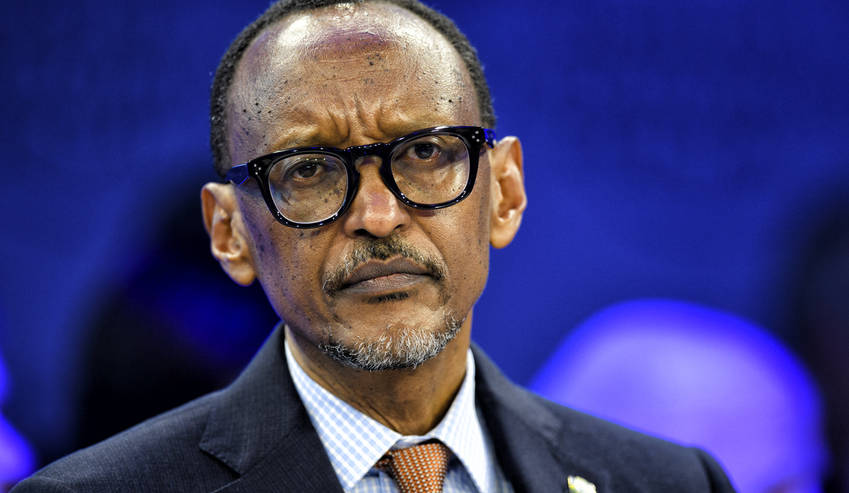
Rwanda: another opponent from the FDU killed
https://www.jambonews.net/en/actualites/20190924-rwanda-another-opponent-from-the-fdu-killed/
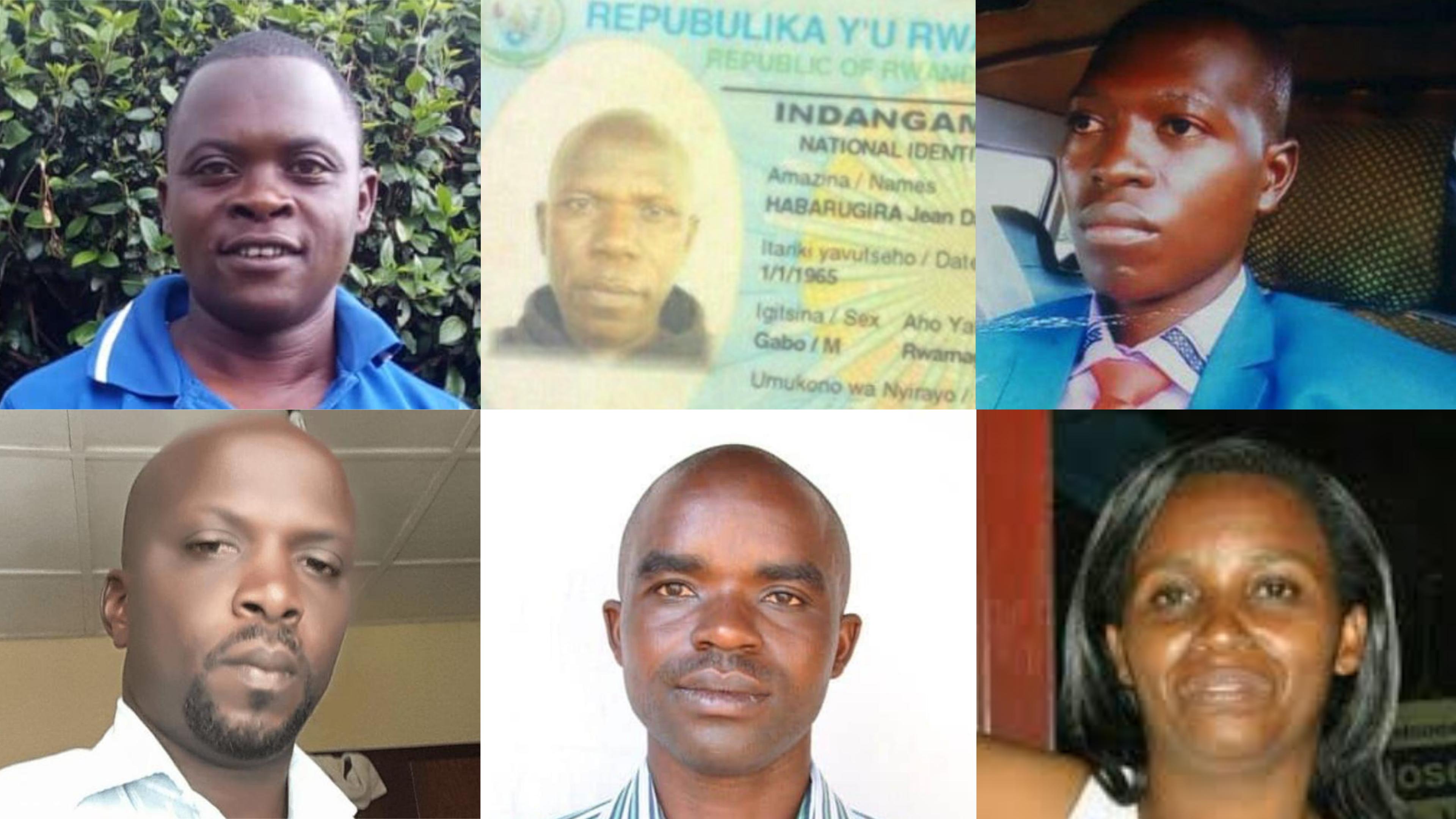
At around 9 p.m., the political opponent was attacked by two men travelling by motorcycle who brutally stabbed him several times. The victim, a father of two, died immediately.
“It’s with profound grief and sorrow, that FDU-Inkingi has to announce that our national coordinator, Mr. Sylidio Dusabumurenyi was savagely stabbed to death this Monday evening, shortly after 9PM. Our thoughts & prayers go to the family of our comrade. May his soul
R.I.P. “commented Victoire Ingabire, the chairperson of FDU, on her facebook account.
FDU is yet to be accepted to operate as a political party in Rwanda. However, many emerging members of the political party are either killed, imprisoned or disappear mysteriously.
In one year time, Sylidio Dusabumuremyi is the fourth member of FDU who has been murdered or disappeared mysteriously. Currently, there is an ongoing trial of 10 other executives of FDU, who have been imprisoned since September 6, 2017.
Rwandan investigation Bureau has announced to have opened an investigation into the murder of Silydio Dusabumuremyi. Two suspects are said to have been arrested.
Rwandan opposition leader's 'throat cut' as Kagame critics are silenced
https://www.telegraph.co.uk/news/2019/09/24/rwandan-opposition-leader-third-killed-single-year/

A senior opposition official has been murdered in Rwanda, the latest
in a series of killings and disappearances involving critics of Paul
Kagame, the country’s president.
Syridio Dusabumuremyi, who served as national co-ordinator for Rwanda’s most vocal opposition alliance, the United Democratic Forces, was found dead in his shop on Monday evening. Colleagues said he had been stabbed several times and his throat cut.

Senior figures in the alliance, known by its French acronym FDU, were quick to call the killing a political assassination. Mr Dusabumuremyi was at least the sixth prominent UDF figure to die violently or disappear in the past three years.
Last October, the UDF’s deputy leader, Boniface Twagirimana, vanished from a high security prison where he had been held on suspicion of trying to overthrow the government and has not been seen since.
An FDU representative in eastern Rwanda disappeared without trace two months ago while the spokesman for the alliance’s leader, Victoire Ingabire, was found dead in a wood in February days after his kidnapping.
Syridio Dusabumuremyi, who served as national co-ordinator for Rwanda’s most vocal opposition alliance, the United Democratic Forces, was found dead in his shop on Monday evening. Colleagues said he had been stabbed several times and his throat cut.
Senior figures in the alliance, known by its French acronym FDU, were quick to call the killing a political assassination. Mr Dusabumuremyi was at least the sixth prominent UDF figure to die violently or disappear in the past three years.
Last October, the UDF’s deputy leader, Boniface Twagirimana, vanished from a high security prison where he had been held on suspicion of trying to overthrow the government and has not been seen since.
An FDU representative in eastern Rwanda disappeared without trace two months ago while the spokesman for the alliance’s leader, Victoire Ingabire, was found dead in a wood in February days after his kidnapping.
None of the cases has been resolved. Although Rwandan police said
they had arrested two suspects in connection with Mr Dusabumuremyi’s
death, Mrs Ingabire said she held out little help that the real
perpetrators would be held to account.
“After several unresolved assassinations of our party members, we
have no hope that his murder will be fully investigated and solved,” she
told the French news agency AFP.
President Kagame has been feted in the West for bringing stability to Rwanda after the killing of 800,000 people in the genocide of 1994. He is also held up as a rare example of an African leader who has distributed Western aid in a transparent and effective manner.
But critics accuse him of presiding over an authoritarian regime whose opponents are frequently jailed or murdered.
President Kagame has been feted in the West for bringing stability to Rwanda after the killing of 800,000 people in the genocide of 1994. He is also held up as a rare example of an African leader who has distributed Western aid in a transparent and effective manner.
But critics accuse him of presiding over an authoritarian regime whose opponents are frequently jailed or murdered.
The regime has refused to register the FDU and when Mrs Ingabire
attempted to stand in the 2010 presidential election she was arrested,
accused of divisionism and “genocide revisionism” and jailed for 15
years.

Mr Kagame, who pardoned her last year, won the 2010 election with 93 percent of the vote. He was re-elected in 2017 with 99 percent after changing the constitution to allow him to remain in office potentially until 2034.
Mr Kagame, who pardoned her last year, won the 2010 election with 93 percent of the vote. He was re-elected in 2017 with 99 percent after changing the constitution to allow him to remain in office potentially until 2034.

